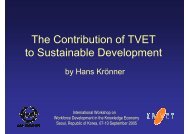Learning for Life, Work and the Future Initial ... - Unesco-Unevoc
Learning for Life, Work and the Future Initial ... - Unesco-Unevoc
Learning for Life, Work and the Future Initial ... - Unesco-Unevoc
Create successful ePaper yourself
Turn your PDF publications into a flip-book with our unique Google optimized e-Paper software.
Page 16 Main <strong>Work</strong>ing Document <strong>Learning</strong> <strong>for</strong> <strong>Life</strong>, <strong>Work</strong> <strong>and</strong> <strong>the</strong> <strong>Future</strong><br />
delivery, <strong>the</strong> training of trainers, cost recovery <strong>and</strong> cost<br />
effectiveness.<br />
While <strong>the</strong>re is a general agreement that <strong>the</strong> Government<br />
has a role to play in supporting <strong>the</strong> in<strong>for</strong>mal<br />
sector, we have also heard of incidents where, when<br />
<strong>the</strong>y are too successful, government chases <strong>the</strong><br />
hawkers away!<br />
To summarise: The in<strong>for</strong>mal sector in Africa is one of<br />
<strong>the</strong> areas of <strong>the</strong> fastest economic growth, employs <strong>the</strong><br />
largest number of workers <strong>and</strong> creates more new jobs<br />
per year than any o<strong>the</strong>r sector. Yet it is not taken<br />
significantly into account by <strong>the</strong> TVET system, perhaps<br />
because of its in<strong>for</strong>mal nature. Never<strong>the</strong>less, <strong>the</strong><br />
sector has great potential <strong>for</strong> subregional co-operation<br />
<strong>and</strong> collaboration in areas such as <strong>the</strong> sharing of<br />
materials, experiences <strong>and</strong> strategies.<br />
9 The Use of In<strong>for</strong>mation <strong>and</strong><br />
Communication Technology in<br />
TVET<br />
The Second International Congress on TVE held in<br />
Korea last year made several recommendations<br />
regarding <strong>the</strong> role of ICT in TVET but, <strong>for</strong> <strong>the</strong> sake of<br />
brevity, only three have been extracted from <strong>the</strong> report<br />
to guide participants in this workshop:<br />
• The new in<strong>for</strong>mation technology has opened up a<br />
whole new potential in technology-based learning.<br />
It should be possible to use <strong>and</strong> apply simple as<br />
well as modern technology <strong>and</strong> <strong>the</strong> new in<strong>for</strong>mation<br />
<strong>and</strong> communication technologies in <strong>the</strong> TVET<br />
teaching <strong>and</strong> learning process without losing <strong>the</strong><br />
valuable aspects of traditional teaching methods,<br />
particularly <strong>the</strong> personal nature of <strong>the</strong> teacherlearner<br />
relationship.<br />
• The new technologies must be harnessed to provide<br />
widespread access to TVET. They have <strong>the</strong> potential<br />
to offer flexibility in time <strong>and</strong> location to TVET<br />
delivery, e.g. using distance-education mode.<br />
• Since technology comes at a price, ways must be<br />
found through partnerships between government,<br />
education, industry <strong>and</strong> communities, <strong>and</strong> through<br />
regional <strong>and</strong> international co-operation, to address<br />
<strong>the</strong> high costs involved.<br />
During <strong>the</strong> 13 th Commonwealth Conference of<br />
Ministers of Education held here in Gaborone in 1997,<br />
Dr David Morris, Vice Principal, Technikon of South<br />
Africa, presented a paper entitled <strong>Work</strong>-Integrated<br />
Education <strong>and</strong> Training: The Golden Triangle <strong>for</strong> <strong>the</strong><br />
21 st Century. His views were that <strong>the</strong> debates around<br />
<strong>the</strong> mounting external pressure of global competitiveness<br />
<strong>and</strong> trends by those concerned with education <strong>and</strong><br />
training, including productivity, reveal an emerging<br />
consensus as to <strong>the</strong> importance of:<br />
• Flexibility<br />
• The rapidly advancing <strong>and</strong> exp<strong>and</strong>ing in<strong>for</strong>mation<br />
<strong>and</strong> communication technologies<br />
• Partnerships between government, education,<br />
business <strong>and</strong> communities.<br />
He concluded that this consensus could best be expressed<br />
as a ‘golden triangle’, with flexibility, technology<br />
<strong>and</strong> partnership at <strong>the</strong> points <strong>and</strong> <strong>the</strong> teacher<br />
<strong>and</strong> worker at <strong>the</strong> centre. With regard to TVET, this<br />
‘triangle’ can be applied to:<br />
• Education <strong>and</strong> training programmes<br />
• Staff development as part of <strong>the</strong> changes that are<br />
taking place<br />
• <strong>Life</strong>long learning <strong>for</strong> continuous professional<br />
development <strong>and</strong> personal enrichment<br />
• Community development <strong>and</strong> life-skills<br />
programmes.<br />
O<strong>the</strong>r possibilities of <strong>the</strong> use of ICT are:<br />
• Establishment of web site <strong>for</strong> TVET practitioners<br />
• An Internet newsletter <strong>for</strong> exchanging innovation<br />
<strong>and</strong> training materials.<br />
10 The Implication of HIV/AIDS<br />
on TVET<br />
The Impact of HIV/AIDS on Education <strong>and</strong><br />
Training<br />
HIV/AIDS presents a critical challenge to <strong>the</strong> viability<br />
of education <strong>and</strong> training system in many countries,<br />
especially Sub-Saharan Africa. As <strong>the</strong> spread of <strong>the</strong><br />
HIV/AIDS epidemic continues, <strong>the</strong> potential of <strong>the</strong><br />
education <strong>and</strong> training sector to respond to <strong>the</strong> root<br />
causes of vulnerability to HIV/AIDS has increasingly<br />
been highlighted.<br />
Preventing HIV/AIDS infection <strong>and</strong> dealing with <strong>the</strong><br />
fear <strong>and</strong> discrimination deriving from <strong>the</strong> epidemic<br />
require careful attention to a range of cultural, social,<br />
religious, health, education <strong>and</strong> training issues as well<br />
as <strong>the</strong> ethical <strong>and</strong> moral ramification of intentions.<br />
HIV/AIDS is inextricably linked to issues that are <strong>the</strong><br />
heart of education <strong>and</strong> training: human rights, human<br />
resource development, community development, <strong>the</strong><br />
status of women, discrimination, personal relationships,<br />
social responsibility <strong>and</strong>, obviously, health.<br />
To achieve sustained control over HIV/AIDS, a multisectoral<br />
analysis of its impact is required <strong>and</strong> an integrated<br />
response must be developed. TVET has a<br />
crucial role to play in <strong>the</strong>se processes.<br />
Below is a list of some of <strong>the</strong> impact of <strong>the</strong> AIDS epidemic:





